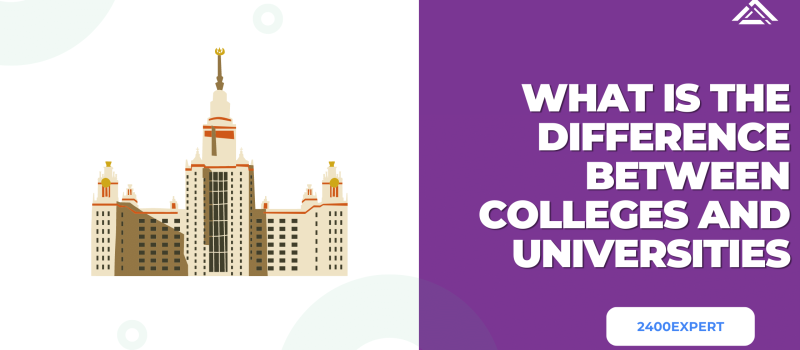What is the difference between ”College” & ”University”? It is often used as an interchangeable term in the spoken language in order to refer to the institutions of higher education, causing a mere decimal of confusion for students, parents, teachers, and faculties.
Apart from the perspective of knowledge and utility of appropriate terms. It is prominently essential to understand the meaning of such interchangeable terms. To avoid unnecessary confusion and conflict and to avoid the chances of obtaining opportunities by overlooking an institution.
Although both colleges & universities offer certain courses and programs of education, there are very few key points of specific difference between the two. Students must be aware of such an intrinsically critical difference when making a decision to pursue higher education.
What is a College?
A College is often referred to as an institution with slightly more intimate campuses accommodating a smaller number of students relatively. Colleges offer fewer programs and courses comparatively offered by Universities.
Colleges are majorly private. So, they receive no affiliation from the state/state-owned Universities or Colleges and hence no state funding as such to encourage research in any specific field of education. Certain colleges might also have some strong religious or community-based affiliations. They provide comprehensive education to students instead of specialization in a particular subject right from the get-go.

Colleges are smaller institutions majorly offering Bachelor’s degree courses, diploma courses, and certain other courses of associate degrees and certification. They focus on a specific discipline such as arts, engineering, literature, animation, health, etc.
Colleges offer a specifically focused discipline and professional specializations in a particular field. Such colleges are known as technical colleges. They are designed to appeal to a relatively smaller group of students with a determined and undying interest in a specified field.
What is a University?
A University is an educational institution offering undergraduate, postgraduate, and several other degrees of education in one place. The university could be a public or private institute. There are several programs taking place simultaneously, which provides a diverse environment for the students.
However, the number of student accommodations varies drastically between public universities and private universities. In some places, A public university may enrol thousands of students. In contrast, in some other places, a public university shows a more selective approach in enrolling students and accommodates only a few hundred.

The nature of public and private universities depends on several factors. A major factor is state affiliation. Universities generally show a specific interest in research and development. Providing impressive and efficient laboratories and research support.
At renowned universities, professors may move their focus to publish and research, which benefits the students by being taught in classes by professors who are highly qualified faculty members in that particular field
Colleges vs University – Overview
| Parameters | College | University |
| Campus Size | Colleges are smaller institutions. They acquire a relatively smaller campus size. | Universities have large campuses. Accommodating a large variety of courses and programs and a large number of students of different interests. |
| Courses & education programs | In colleges, courses are often limited to undergraduate studies. There are no other optional programs of learning and curriculum. | In universities, courses and education programs may vary drastically. It offers undergraduate, postgraduate, and several other degrees of education. It also offers several additional curriculum programs of learning which are often optional for students to take up as per their Inclination. |
| Degree | Colleges offer undergraduate degrees. | Universities offer an undergraduate degree, and a postgraduate degree leading up to a PhD degree. |
| Budget | Colleges offer a much more affordable fee structure than a university. | Universities provide a large variety of courses and multiple programs additionally offered to students. It makes the university much more expensive. |
| Faculty | In colleges, the number of faculties and facilities are limited. | Universities have large spaces to offer several faculties and facilities. |
Pros and Cons of College
Here are some pros and cons of college here.
Pros of Colleges
- Colleges provide a devoted environment and a flourishing discipline to students for a specific field of learning.
- Colleges are much of an affordable option in comparison to universities. Comparatively, Colleges charge a fraction of tuition fees than Universities. Although, it could be a variable factor depending upon certain other factors such as the program of education, duration of the program, etc.
- Colleges are institutions with slightly more intimate campuses accommodating a smaller number of students allowing the space for a personalized set of instruction and assistance from the professors and faculty members.
Cons of Colleges
- Colleges often tend to offer a constrained curriculum, and they also don’t offer a variety of programs of education as universities.
- Colleges with a devoted environment offering a specific discipline of education lack diversity. Students of technical colleges may often struggle with personal development, self-esteem, and confidence issues.
- Colleges don’t provide a space to encourage research in any specific field of education. It also doesn’t provide any financial aid to students due to a lack of credible affiliations.
Pros and Cons of University
Here are some pros and cons of university here.
Pros of University
- It gives you a wide range of courses and programs of education to choose from, which slings with your interest, skills, abilities, experience, and career path.
- Universities give an incredibly diverse environment. Allowing a safe & friendly space for students to work with students, faculty members, and staff members coming from different domains and backgrounds.
- In universities, classes are taught by professors who are often involved in some research and publishing or other. They provide an enriching, dynamic, innovative, and enhancing learning experience.
Cons of University
- Universities have large classes, which could be a hurdle for faculty members and professors in teaching and research.
- University costs of tuition, accommodation, books and board is an expensive tradeoff that often results in heavy student loan debt.
- Some students thoroughly enjoy their experience in a diverse and friendly environment of bustling communities while other students may feel lost, isolated, and outcasts being surrounded by more vocally active peers.
When to Choose College?
- Students and parents must be aware of the several attributes of the institution while they are on the brink of making a decision. .
- Students who are specifically dedicated and adamant about what they want to study and pursue in their career approach for a near future
- A College could be a great match for students who want to avoid excess time and money on general education.
- Students who want to run on efficiency mode with respect to their time. Hence, they want to enter the workforce in the least time possible. Those students may find a technical college a preferable fit as per their needs and requirements.
Things You Need To Keep In Mind Before Choosing Between A College Or A University
Let’s take a quick look at the 3 things you should keep in mind before choosing a college or a university
1. Student Life
This could be considered as one of the most important factor in a student’s growth while staying away from the family. When the international students are away from their family it’s important that they are not distracted. College or University will provide with various opportunities to keep students engaged and enjoy the experience. Before you decide which campus you want to go with make sure you are familiar with their activates and programs.
2. Class Size
Your learning style will be important to decide which one is to choose between a College or a university. Universities have larger classes compared to Colleges. Both have their own perks, Larger classes can make you feel overwhelming and with smaller classes you might carry a better communication with the professor.
3. Career Opportunities
If you are looking to earn a master’s degree or PHD you may look for Universities in USA. Universities focus more on research. You might find the right facilities and opportunity. Now if you are looking to learn something a particular filed or undergraduate program, College will be the right option for you.
When to Choose University?
- As on the student’s part, it comes down to a responsibility to explore the higher education options that lay out there. They are free to explore in terms of interest, personal inclination, and financial viability.
- A University could be an effective choice if you find it confusing and overwhelming to choose a specific line of discipline.
- Universities provide an endless trail of academic pathways for students, carving and gathering people and resources in one place. Students with a generalist approach find it quite lucrative for themselves to manoeuvre their way out with something they like and decide to take it up by themselves.
- A University is a good choice for students who want an enriched learning experience with vibrant campus communities, diverse, friendly, welcoming student bodies, and an enhancing environment.
Related Read:
- The Youngest College Graduates List
- Best Law Schools With Scholarships
- Best Business Schools In The World
- Best GMAT Prep Courses
Final Thoughts: What Is The Difference Between Colleges and Universities (2024)
Each institution of higher education comes off as a bundle of advantages and disadvantages of its own. It’s up to you to make a decision based on your need and requirements to determine which institution aligns the best with your personal interest, professional goals, personality, and financial viability.
We understand that being bombarded with a lot of information in a short time overwhelms you and makes it even worse when you’re under pressure to make the right decision at the right time.
The whole procedure of choosing a higher education institution and getting into one could be a delimmatically challenging experience for some people. If you find yourself unique make such a critical decision on your own. Then, don’t shy away from taking up the help. You may consult career advisors and career counsellors to guide you through the entire process of identifying your specific needs, qualifying for the learning programs, and assisting you throughout the application process.
It could be vital in deciding which institution to go for, keeping in mind your career trajectory and what you want.
Looking up for Colleges and Universities, researching their learning pathways, programs, the curriculum of the course, development activities, and extension activities along with the financial ramifications of that particular institute in a specific discipline, course, or field accompanied by financial aid and scholarship they have on their institution and what percentage of students finds it feasibly effective.
All such questions are part of the daunting process of research while making a decision to pursue higher education. While you know the critical line of difference between College & University. You are capable of making wise decisions while picking or discarding out the options that will work wonders for you.
